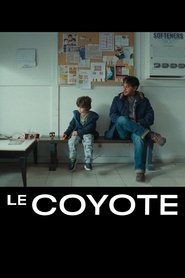Seattle International Film Festival 2023: Film #33
Not only does Coyote open like a Dardenne brothers film with a face being interviewed 'by' the camera, it continues in something of the same medium-to-slow-paced manner seen in their 'social impact' films, with Mexican immigrant Camilo returning home in the early hours after a gruelling night shift and attempting to sleep in the bright daylight.
Yet the early glimpse of Camilo's dream sets it slightly apart from being a piece of French-Canadian Dardennespolitaton, even though Coyote feels highly naturalistic from top to bottom, both in the internal pacing of scenes and the broader arc of the film. There are a few reasonably broad strokes, however. For instance, Camilo's grandson rejects his 'exotic' Mexican food at first, emblematic of both Camilo's real calling and an opportunity to provide a semblance of home and connection. And in the broader perspective of the film's message, Camilo's food is an obvious symbol of the difficulties involved in cross-cultural, inter-generational exchange and the (underexplored) dynamics between first- and second-wave immigrants. His grandson cannot speak Spanish either, further increasing the emotional distance between them.
It would have been a nice touch if Camilo didn't hand in his notice at the cleaning job, thus encapsulating his fear that his daughter Tania won't be back from rehab in time. But perhaps this would have been too cute, despite that alternative perhaps being more true to life: why would Camilo respectfully hand in his notice, save for the idea that he is blinded by his dream of returning to being a real chef? Of course, we can quickly guess at the film's primary tension as soon as we're told that Tania will 'definitely' be out of rehab before Camilo needs to move for his great, new job, but somehow it doesn't quite matter within the context of the film. (As an aside, note that when Tania falls asleep on the couch, her arm falls bicep-up precisely like a junkie; a sort of contrapposto for those with a substance abuse problem.)
Still, if Coyote is a 'message drama', it does not make its message particularly obvious. We are told that the child has been offered foster care—presumably by the state?—and nor are funds seem required for Tania's drug rehab. So what is Coyote 'asking' for?
Synopsis: A cook in his heyday, Camilo is now a worn-out fifty-year-old who works for a cleaning company. We can guess a personal failure in the past of this solitary Mexican living in Montreal. However, Camilo wants to get back on track and an opportunity to recover his culinary passion finally presents itself. Everything is in place for this new beginning when Camilo receives a visit from his daughter Tania, with whom he had cut ties because of her drug addiction. She tells him that he is a grandfather and asks him to take care of the child while she undergoes her umpteenth rehab. The arrival of this grandson will upset Camilo’s plans. There will be a new beginning for him, certainly, but not as he imagined it.

